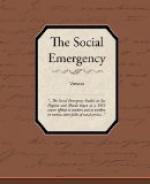If the minimum is rightly placed at $10, and if the investigations are true in showing that the majority of self-supporting women the country over are receiving less than this amount, we may now come to a more detailed discussion as to the relation between underpayment and vice. It is just here that it is easy to jump at conclusions. Most people approach social questions not with a scientific mind, but with preconceptions which mar their judgment. For example, the socialist exaggerates the effect of bad wage conditions, and the Woman’s Auxiliary Department of the police exaggerate the influence of home conditions. Again, personal testimony is unreliable, because, on the one hand, victims of the social evil are liable to blame external conditions; and, on the other hand, well-fed, well-housed investigators often underestimate the bad moral effect of poor nourishment and fatigue.
Of this much we may be certain: low wages poor living, which involves poor housing, poor food, no savings, and either no recreation or dependence on others for it. In the federal report on living conditions of women in stores and factories, it is estimated that in the seven cities where the investigation took place approximately 65,000 women are adrift.[20] Since the majority of these are receiving less than the minimum cost of a decent living, they are “perilously defenseless young women.”
Another federal report,[21] bearing directly on the relation between conditions of work and vice, concludes that whereas few girls “go wrong” on account of poverty, the misstep once taken, poverty and want are powerful deterrents to reform. A fourfold classification is made of immoral women, as follows: (1) Unmarried mothers; (2) girls who leave and regain the path of virtue, having their fling for the sake of good times; (3) occasional prostitutes, who enter the career as a business for a while; (4) professional prostitutes. Mention should be here made of this report, because its total effect is to minimize economic causes of prostitution, placing the responsibility elsewhere than on industrial conditions. It is to be noted, however, that it does emphasize the indirect effects of poverty, and does speak of the moral danger lurking in certain occupations, and of the bad effects of the lack of industrial education.
More definite responsibility for vice is ascribed to low wages in the reports of vice commissions. The Chicago Report says that of one group of 119 immoral women, 18 came from department stores, and 38 said that they had taken up the career for the need of money. The Portland Report presents 22 women as “Cases in which Low Wage and Vice are closely associated."[22] The Report continues:—




